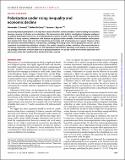Polarization under rising inequality and economic decline
Abstract
Social and political polarization is an important source of conflict in many societies. Understanding its causes has become a priority of scholars across disciplines. We demonstrate that shifts in socialization strategies analogous to political polarization can arise as a locally beneficial response to both rising wealth inequality and economic decline. In many contexts, interaction with diverse out-groups confers benefits from innovation and exploration greater than those that arise from interacting exclusively with a homogeneous in-group. However, when the economic environment favors risk aversion, a strategy of seeking lower-risk in-group interactions can be important to maintaining individual solvency. Our model shows that under conditions of economic decline or increasing inequality, some members of the population benefit from adopting a risk-averse, in-group favoring strategy. Moreover, we show that such in-group polarization can spread rapidly to the whole population and persist even when the conditions that produced it have reversed.
Citation
Stewart , A J , McCarty , N & Bryson , J J 2020 , ' Polarization under rising inequality and economic decline ' , Science Advances , vol. 6 , no. 50 , eabd4201 . https://doi.org/10.1126/sciadv.abd4201
Publication
Science Advances
Status
Peer reviewed
ISSN
2375-2548Type
Journal article
Description
Funding: The authors acknowledge funding from the Defense Advanced Research Projects Agency NGS2 program (grant D17AC00005 to A.J.S.) and the AXA Research Fellowship Award (to J.J.B).Collections
Items in the St Andrews Research Repository are protected by copyright, with all rights reserved, unless otherwise indicated.

